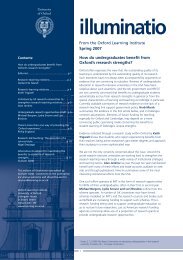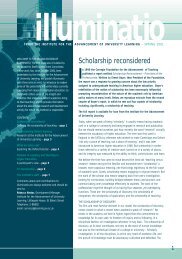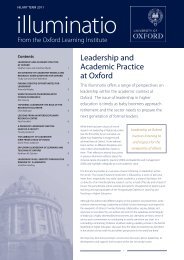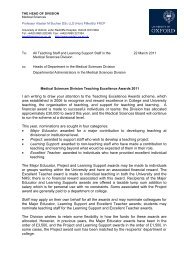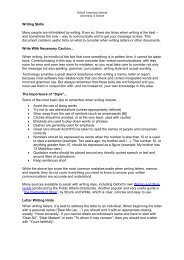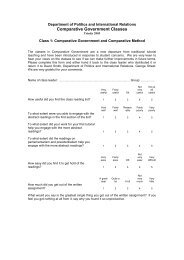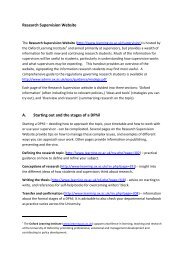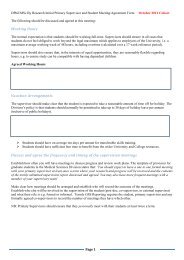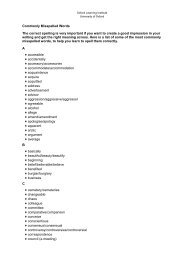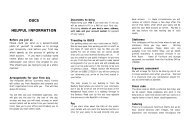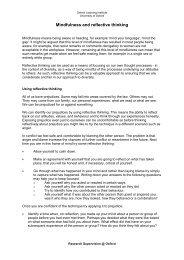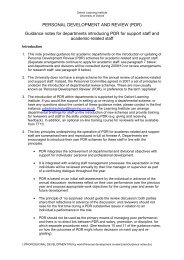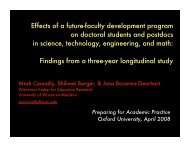Developing the whole student - Oxford Learning Institute - University ...
Developing the whole student - Oxford Learning Institute - University ...
Developing the whole student - Oxford Learning Institute - University ...
Create successful ePaper yourself
Turn your PDF publications into a flip-book with our unique Google optimized e-Paper software.
Stimulus paper by Kathleen M. Quinlan 16<br />
To <strong>the</strong> extent that holistic <strong>student</strong> development focuses on <strong>student</strong>s’ becoming au<strong>the</strong>ntic,<br />
creating intention in <strong>the</strong>ir own lives, developing a sense of deeper meaning and respecting<br />
cultural differences, higher education can be seen as developing au<strong>the</strong>ntic leaders for <strong>the</strong><br />
future. To create <strong>the</strong> conditions that support such <strong>student</strong> development, leaders must,<br />
<strong>the</strong>mselves, strive to model a meaningful, au<strong>the</strong>ntic life.<br />
Leadership of learning for holistic <strong>student</strong> development<br />
There is very little systematic research on leadership effectiveness in higher education 108 .<br />
In <strong>the</strong> preceding sections I have drawn primarily on broader studies of campuses that are<br />
focusing on holistic <strong>student</strong> development or on more general leadership studies. In this<br />
section I draw on some of <strong>the</strong> much more substantial body of literature on primary and<br />
secondary school leadership and <strong>the</strong>n link it to recent arguments about leadership in<br />
higher education.<br />
108<br />
Bryman (2007)<br />
109<br />
Robinson, Lloyd et al (2008)<br />
110<br />
Leithwood (2006)<br />
111<br />
Robinson et al (2008)<br />
112<br />
Robinson, Lloyd et al (2008)<br />
113<br />
Goodall (2009), MacFarlane<br />
(2011)<br />
In <strong>the</strong> schools sector, where <strong>the</strong>re are considerable policy pressures to enhance <strong>student</strong><br />
learning, <strong>the</strong>re is both more attention paid to <strong>the</strong> role of <strong>the</strong> leader in turning around<br />
school performance and more research linking leadership with <strong>student</strong> outcomes. The key<br />
debate seems to be whe<strong>the</strong>r leaders (principals) primarily have a direct effect on <strong>student</strong>s<br />
through instructional leadership 109 or whe<strong>the</strong>r <strong>the</strong>ir influence is primarily indirect, by using<br />
transformative leadership to create positive relationships and environments in which<br />
teachers can positively affect <strong>student</strong>s 110 . The transformative <strong>the</strong>ory of leadership is more<br />
closely aligned with <strong>the</strong> notion of au<strong>the</strong>ntic leadership, while <strong>the</strong> instructional leadership<br />
model is more focused on tasks and technical involvement in teaching.<br />
To resolve conflicting evidence in <strong>the</strong> empirical literature on <strong>the</strong> effects of leadership<br />
on <strong>student</strong> outcomes, Robinson et al 111 re-analysed 27 studies of leadership in schools,<br />
breaking down leadership into types and specific leadership dimensions. They found <strong>the</strong><br />
instructional leadership type has three to four times more effect on <strong>student</strong> outcomes<br />
than a model of transformative leadership. Of specific leadership dimensions associated<br />
with enhanced <strong>student</strong> outcomes, <strong>the</strong> strongest effect was found for leaders promoting<br />
and directly participating in formal and informal teacher learning and development<br />
alongside teachers (mean effect size .84). Two o<strong>the</strong>r key dimensions (each with mean<br />
effect sizes of .42) were a) establishing goals and expectations and b) direct involvement in<br />
planning, coordinating and evaluating teaching and <strong>the</strong> curriculum through such actions<br />
as coordinating across classes and years, regular classroom visits and giving feedback to<br />
teachers. They conclude that ‘<strong>the</strong> more leaders focus <strong>the</strong>ir relationships, <strong>the</strong>ir work and<br />
<strong>the</strong>ir learning on <strong>the</strong> core business of teaching and learning, <strong>the</strong> greater <strong>the</strong>ir influence<br />
on <strong>student</strong> outcomes’ and fur<strong>the</strong>r argue for ‘leadership research and practice to be more<br />
closely linked to <strong>the</strong> evidence on effective teaching’ 112 .<br />
None<strong>the</strong>less, although <strong>the</strong> model and results are drawn from schools, recent writing on<br />
leadership in higher education arguing for <strong>the</strong> importance of intellectual leadership 113<br />
in higher education suggests support for this <strong>the</strong>ory. Each explores how scholars are<br />
positioned as leaders, ra<strong>the</strong>r than as professional managers, arguing for <strong>the</strong>ir leadership<br />
authority because of <strong>the</strong>ir strong knowledge of <strong>the</strong> content of what is being led and <strong>the</strong>ir<br />
context knowledge.<br />
My model proposes that leaders need to pay attention both to modelling meaningful lives<br />
through a focus on people and relationships and creating an intentional culture rooted in<br />
self-reflection and ethical action (ie transformative leadership), which has an indirect effect



